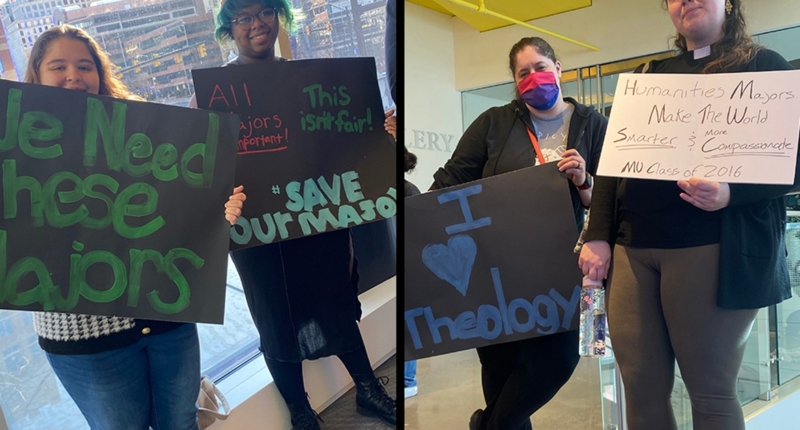In response to changing student interests, Marymount University and St. Mary’s University of Minnesota are eliminating liberal arts majors, mostly in humanities, with other Catholic universities following suit. The declining number of higher education graduates in the humanities, which has decreased by 29.6% from 2012 to 2020, could be attributed to the changing perception of higher education’s societal value. Data indicate that Catholic institutions have experienced the sharpest declines, including the University of Notre Dame, which recorded 50% fewer humanities graduates. While some schools, like Siena College and the University of Notre Dame, continue to emphasize the value of liberal arts and humanities education, higher education leaders are still looking for ways to demonstrate how such education leads to successful careers.
Catholic Colleges Eliminating Humanities Programs Citing Lack of Student Interest
The future of humanities at two Catholic universities is being called into question as officials consider reshaping their academic offerings in light of changing student interests. At Marymount University in Arlington, Virginia, the board of trustees voted unanimously to eliminate nine liberal arts majors, most of which are in the humanities. The decision has left some students feeling dismayed and concerned about the impact on future students. The majors affected include bachelor degree programs in art, economics, English, history, mathematics, philosophy, secondary education, sociology, theology and religious studies, and a master’s program in English and humanities.
Marymount University’s Director of Communications, Nick Munson, stated that these programs are “simply not ones that are in demand.” Of the 4,257 students currently enrolled, only 74 are enrolled in the affected programs, with 22 of those set to graduate in May. In response to the vote, some alumni and faculty have expressed concern over the decision, citing the value of the humanities in teaching soft skills that are valuable in a variety of industries.
Marymount University plans to redirect resources to “areas of growth” such as nursing and healthcare fields, which are in high demand. While some students’ majors won’t be impacted by the change, others are worried about the legacy of the school and the availability of majors in a Catholic setting. The decision to eliminate humanities programs is a reflection of similar decisions being made throughout higher education, as colleges and universities weigh the costs and benefits of reshaping their academic offerings in response to changing student interests.
Fewer Humanities Programs Being Offered in Higher Education
St. Mary’s University of Minnesota announced in May that 11 majors would be eliminated in the coming years, including English, art, history, music, Spanish, theater, and theology. This decision, which is similar to Marymount University’s elimination of humanities programs, reflects a larger trend in higher education. School officials are weighing the costs and benefits of reshaping their academic offerings in response to changing student interests.
The decline in humanities majors has also sparked a debate on how American society values professions that explore human relations and bring meaning to life. According to data compiled by the U.S. Department of Education’s National Center for Education Statistics, the number of higher education graduates in the humanities has declined by 29.6% from 2012 to 2020. The number of humanities graduates has declined for eight consecutive years, with schools reporting 117,351 humanities graduates in 2012 and 82,646 in 2020.
Catholic institutions have not been immune to this trend, with some schools reporting steep declines in the humanities during the period. For example, the data show the University of Notre Dame with 50% fewer humanities graduates, and other Catholic schools reporting declines as steep as 93%.
Vincentian Fr. Dennis Holtschneider, the president of the Association of Catholic Colleges and Universities, acknowledged hearing that interest in the humanities is waning, leading higher education leaders to review which majors are worthwhile to maintain. While some schools have taken steps to combine majors in the humanities to keep programs alive, there is no evidence that this decline is cyclical.
These days, health care, engineering, and technology are growing in popularity, which is reflected in the increase in demand for related majors. As schools consider reshaping their academic offerings, they are redirecting resources to areas of growth, such as nursing and health care fields, which are in high demand. The changes in academic offerings are a reflection of the changing times and evolving interests of students.
The Value of Humanities Education in Higher Education
Despite the decline of humanities programs in higher education, school officials still maintain a variety of liberal arts and humanitarian course requirements to provide a broad education for students and to keep key faculty on staff. The humanities have experienced upward and downward swings over the decades, largely paralleling economic booms and busts. However, even after the Great Recession of 2008 and 2009, there was an uptick in humanities enrollment for a few years.
Rob Townsend, program director for humanities, arts, and culture at the American Academy of Arts and Sciences’ Humanities Indicator Project, suggests that there is a misperception throughout society about the value of a humanities degree. He feels that there has been a shift from the idea that a lot of college-educated people, especially broadly educated people, make society better to a private good notion of the purpose of higher education. Higher education leaders are striving to instill the idea in students and their parents that education in the liberal arts and humanities will help a young college graduate establish a meaningful career.
Chris Farnan, the dean of the School of Liberal Arts at Siena College in Loudonville, New York, said that while the number of humanities majors has declined, faculty and administrators continue to stress the value of the arts, history, literature, and theology as key to developing the human person. Liberal arts and humanities majors have an in-depth knowledge of human history, an understanding of the way human beings have related to each other, and have read widely and deeply. Siena College has no plans to eliminate majors, as Farnan questions whether there would be discussions about the death of a major if there was a huge drop in business majors.
At the University of Notre Dame, Sarah Mustillo, the dean of the College of Arts and Letters, questions the federal data on humanities graduates for the school. She said the university has recorded a 9% decline in humanities graduates since 2012, rather than the 50% figure listed in the Department of Education’s data. Despite the decline in the number of humanities graduates, some higher education institutions continue to stress the importance of humanities education in developing students as human beings who can make the world more peaceable, just, and humane.
The humanities are facing a decline in popularity among college students, with many Catholic universities, such as Marymount University and St. Mary’s University of Minnesota, announcing the elimination of humanities majors due to lack of student interest. Catholic institutions have recorded some of the steepest declines in the humanities over the past decade, with the University of Notre Dame seeing 50% fewer humanities graduates since 2012. However, some schools, such as Marymount University, have maintained the number of humanities graduates during the same period. The decline in humanities enrollment has occurred despite the economic boom of the pre-pandemic era.
Vincentian Fr. Dennis Holtschneider, president of the Association of Catholic Colleges and Universities, has heard that interest in the humanities is waning, leading to a review of which majors are worthwhile to maintain. While some institutions have combined majors in the humanities to keep programs alive, higher education leaders are striving to instill in students and their parents the idea that education in the liberal arts and humanities will help graduates establish meaningful careers. The humanities provide essential skills such as critical thinking, communication, empathy, and teamwork.
The value of the humanities has been a subject of debate among experts, with Rob Townsend, program director for humanities, arts, and culture at the American Academy of Arts and Sciences’ Humanities Indicator Project, suggesting a societal shift from the idea that college-educated people are essential to making society better to a private good notion that a college degree benefits individuals. Catholic universities such as Siena College in Loudonville, New York, and the University of San Diego have taken steps to emphasize the importance of broad-based education and established Humanities Centers to support humanities education. Despite these efforts, students have been dropping humanities majors, leading to cuts in majors offered by Catholic institutions.
Don’t miss interesting posts on Famousbio









